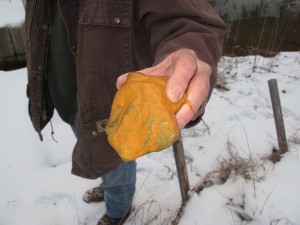Study finds acid mine drainage reduces radioactivity in fracking wastewater

Susan Phillips / StateImpact Pennsylvania
A rock pulled from the bottom of a creek in Tioga County is covered in orange slime, resulting from iron sulfide in mine water drainage.
Using polluted water from abandoned coal mines to frack natural gas wells has been suggested by the state and some environmentalists in Pennsylvania. Now, researchers at Duke University have found it could leverage one industry to help clean up the toxic legacy of another – and vice versa.
A peer-reviewed study published last month in the journal Environmental Science and Technology shows that when mixed together, acid mine drainage can act like a treating agent to remove radioactive material from fracking wastewater.
In the lab, samples provided by the natural gas industry were blended together. In about 10 hours, radioactive elements like radium and barium combined with the sulfate in the acid mine drainage to create a solid mineral called strontium barite.
Duke Professor Avner Vengosh, a co-author of the study, explained those solid minerals can be removed and disposed of in landfills and the water leftover can be used to frack new wells or sent to facilities for more treatment.
“So we see it as kind of a win-win situation,” said Vengosh. “You’re not just dumping acid mine drainage into the environment, but actually using this instead of valuable fresh water.”
Vengosh also co-authored a study published last fall that found high levels of radiation and salt in a creek near a drilling wastewater treatment facility in western Pennsylvania. He says mixing it with acid mine drainage could prevent these problems.
“If you are blending it with water from fracking fluid that could be disposed to the environment, you’re preventing this contamination from the creeks,” he said.
Fracking just one well can take more than four million gallons of water. The state has discouraged the use of fresh water sources and instead, wants drillers to use water from miles of lifeless streams that have been polluted by coal mining.
But some gas drillers are hesitant to use acid mine drainage out of fear that they will be liable for cleaning up these streams forever. A bill making its way through the Pennsylvania legislature aims to lower their liability.
















